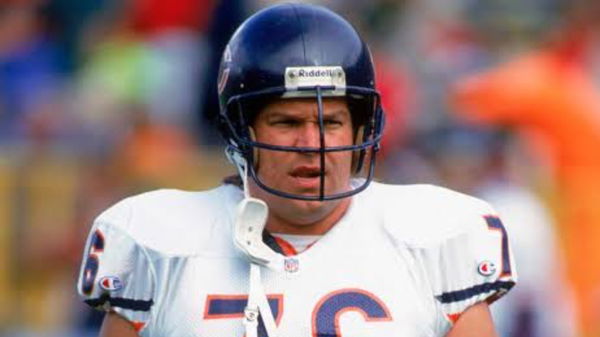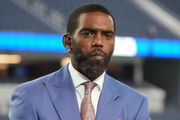
Getty
GREEN BAY, WISCONSIN – SEPTEMBER 20: Steve Young looks on from the Monday Night Football set before a game between the Green Bay Packers and the Detroit Lions at Lambeau Field on September 20, 2021 in Green Bay, Wisconsin. (Photo by Wesley Hitt/Getty Images)

Getty
GREEN BAY, WISCONSIN – SEPTEMBER 20: Steve Young looks on from the Monday Night Football set before a game between the Green Bay Packers and the Detroit Lions at Lambeau Field on September 20, 2021 in Green Bay, Wisconsin. (Photo by Wesley Hitt/Getty Images)
It’s hard to talk about the 1985 Chicago Bears without picturing Steve “Mongo” McMichael wreaking havoc in the trenches. He wasn’t just a cog in Buddy Ryan’s legendary 46 defense—he was its ironman, helping the Bears to their ’85 Super Bowl run. The man went on to play in a franchise-record 191 consecutive games right after joining the Bears in ’81, all while piling up 92.5 sacks, second only to Richard Dent in franchise history.
Watch What’s Trending Now!
The Bears legend led the team in sacks in 1988 and 1992, and his three safeties—all against the Packers—are still a Bears record. But McMichael’s legacy stretched beyond the gridiron. After football, he brought his larger-than-life persona to WCW wrestling, joining The Four Horsemen and winning the U.S. Heavyweight Championship. The star defensive tackle was inducted into the Hall of Fame in 2024.
His Hall of Fame speech that started with “Hey Chicago Bears fans and Mongo fans. Woohoo! I’m in the Hall of Fame baby!” was a moment of poetic justice for a man whose toughness defined a generation. But on Wednesday, that indomitable spirit was finally quieted. Steve McMichael, the Bears’ star defensive tackle, died following a battle with ALS. He was 67.
ADVERTISEMENT
Back in 2021, McMichael revealed that he was diagnosed with ALS, also known as Lou Gehrig’s disease. The disease affects nerve cells in the brain and spinal cord, causing loss of muscle control. Following McMichael’s death, the former 49ers quarterback, Steve Young, took to his social media handle and paid tribute to the Bears‘ legend, while addressing the ALS struggles faced by players. “What a legend,” he wrote in his IG story.
“The struggles for former players can be very real. We’re working with Spinogenix as they complete phase 2 trials helping to treat ALS with a new approach—one with the potential to be regenerative, give function back, and restore hope.” Prior to his ALS diagnosis, McMichael experienced tingling in his arms for some time that turned out to be a neck or spine issue, as a result of his playing career or his work as a wrestler.
Back in September 2020, a neurosurgeon at the Mayo Clinic confirmed that McMichael had ALS. However, the former DT sought other opinions. A few months later, doctors in Chicago confirmed McMichael’s ALS diagnosis. “He’s scared to die, and he shouldn’t be because he’s the most badass man I’ve ever known inside and out,” his wife, Misty McMichael, said before her husband’s Hall of Fame induction.
ADVERTISEMENT
“He’s a good man, he’s gonna be in heaven before any of us, so I don’t know what he’s afraid of. But I’ve told him to please hang on ‘til the (induction) and then, you know, I don’t want to see him suffer anymore. He’s been suffering.” Following his ALS diagnosis, McMichael largely withdrew from the public eye. But photos shared by friends and family on social media revealed the toll the disease had taken—once a 6-foot-2, 270-pound powerhouse had grown rail-thin.
Considering the impact of ALS on former players, Steve Young is now working with Spinogenix on developing treatments for ALS that include other neurodegenerative diseases as well.
ADVERTISEMENT
How are Steve Young and Spinogenix addressing the ALS struggles?
As per the study conducted by JAMA Network Open, the athletes who played in the NFL (say, more than 7 years) have a nearly 4 times greater rate of developing and dying from ALS. Take Steve Gleason, the former Saints‘ safety, for instance. Just five years after hanging up his cleats, Gleason was diagnosed with ASL, which resulted in a loss of his voice.
Right after his battle from ASL, he founded Team Gleason, a nonprofit that provides technology and support for people living with ALS. For this very reason, Spinogenix, a clinical-stage biopharmaceutical company, is keen to address conditions such as ALS, Alzheimer’s disease, schizophrenia, and more. Last year, Spinogenix named the former 49ers quarterback, Steve Young, to its board of directors.
ADVERTISEMENT

ADVERTISEMENT
“Spinogenix is tackling critical work in their mission to reverse the impact of synapse loss for those affected by conditions such as ALS, Alzheimer’s disease, schizophrenia, and more,” Young said. “The need to understand and treat brain diseases and injuries is something I’m deeply passionate about, having seen firsthand the toll these conditions take on patients and their families. I’m honored to join the board at Spinogenix and look forward to working with this dedicated team as they pursue transformative solutions to improve the lives of patients worldwide.”
Top Stories
Russell Wilson Breaks Silence on Connection to Jeffrey Epstein As Discreet Seahawks Contract Decision Reportedly Exposed

NFL Makes Punishment Decision on Sam Darnold’s Seahawks After NFC Conference Championship Win

NFL Rumors: George Kittle Set for 49ers Exit Amid $6.3B Franchise’s Interest

NFL Fans Receive Clear Message on Canceling Pro Bowl Games as Roger Goodell Faces Tough Decision

ESPN Abruptly Cancels Weekly Telecast With Randy Moss Amid Billion-Dollar NFL Takeover

You see, it’s easy to feel helpless when someone comes across a disease like ALS. You watch NFL legends like Steve McMichael, who once was known for wreaking havoc in the trenches, slowly lose their movement, their independence, and their lives. But behind the scenes, there’s a growing wave of research trying to change that. One of the more promising efforts? A new approach from Spinogenix that intends to regrow lost brain connections. And to make it more obvious, their experimental drug, SPG302, just entered early human trials.
ADVERTISEMENT
ADVERTISEMENT
ADVERTISEMENT
ADVERTISEMENT
.png)
.png)
.png)



